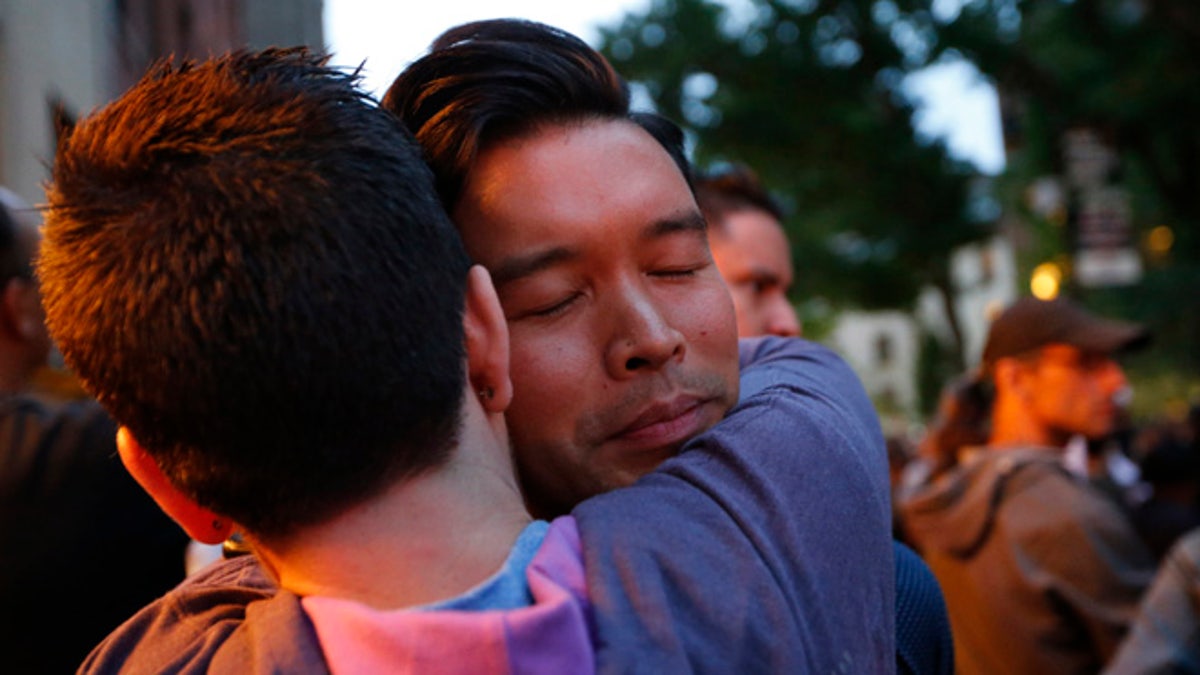
A vigil for victims of the Orlando nightclub shootings at the Stonewall Inn, a gay bar, Monday, June 13, 2016, in New York. (Copyright 2016 The Associated Press. All rights reserved. This material may not be published, broadcast, rewritten or redistribu)
ORLANDO, Fla. (AP) – When the names of the victims in the worst mass shooting in modern U.S. history are read aloud at memorials around the world, the surnames stand out:
Martinez.
Fernandez.
Guerrero.
Most of the 49 people shot and killed were Hispanic, and the tragedy has left Florida's Latino community heartbroken over the loss of young lives. Many were also gay — which means that Saturday evening at Pulse was the fateful intersection of two tight-knit communities, ones that have existed until recently on the fringes of central Florida's society.
"As a Hispanic, we already have that fear we don't belong," said 34-year-old Nicole Neko-Montalvo of Orlando. "We also have that fear as homosexuals. To be targeted twofold is overwhelming."
Hispanic residents made up almost half of Florida's population growth last year, and in Orange County — where Orlando is located — Hispanics comprise nearly 30 percent of the population. The Puerto Rican community is especially robust, with more than 1 million in Florida, nearly the same as New York.
"It's not lost on me that it was Latino night at Pulse," said pastor Gabriel Salguero of Orlando, adding that some of the victims have family members who attend his large evangelical church.
Salguero spoke to thousands Monday night at a vigil in downtown Orlando. He addressed the crowd in both English and Spanish, calling for "no mas" gun violence and proclaiming "si, se puede," — yes, it is possible to rebuild the community after such a tragedy.
Many have hope that the shooting will make everyone — gay, straight, white, black, Hispanic — come together, be more tolerant.
"It's opening eyes to our community," said Jason Primar, whose two friends, Xavier Serrano Rosado and Leroy Valentin Fernandez, died in the shooting. Primar also attended the vigil, and tearfully released a gold balloon as a memorial to his friends.
"It's time we're accepted by all," he said. "For the purpose of love, not to hate."
Said Tabbitha Segui, a 23-year-old originally from Puerto Rico, who also knew Xavier Serrano: "We're all just one person. We all have the same blood, the same heart."
In the wake of the shooting, two dozen national and regional Latino groups are trying to do just that. They've formed a coalition called "Somos Orlando" (We Are Orlando) to offer counseling and therapy to people who have been affected. And everyone, it seems, knows someone who was involved, injured or killed.
Jose Calderon, the president of the Hispanic Federation, said the attack struck a community that had long been in the shadows of society and had sought "a safe space," like the Pulse nightclub, to be together.
"What little safe space they had created with this club in Orlando has been stripped from them," he said. "Their once safe place, where they could be with people who loved them and didn't judge them, is now gone."
He says it's especially painful for LGBT Latinos because they endure a "double stigma," being gay and being Latino.
Pastor Salguero said that stigma must be removed.
"I don't think the Latino community is any more biased than any other community," he said. "We're all fallen and we're all broken and we have to do something to get along without killing each other."
Stories of the victims emerged as the families prepared for burials.
Juan Ramon Guerrero, 22, told his family only a few months ago he was gay. His cousin, Robert Guerrero, said the family accepted it and embraced the person with whom he was in a relationship.
"He was always this amazing person (and) he was like a big brother to me," he said of his cousin.
Edward Sotomayor, 34, died in the attack. Sotomayor was well-known because he worked for a company that organized gay cruises. He always wore a top hat during the cruises. His cousin, David Sotomayor, is a drag queen who appeared on "RuPaul's Drag Race."
The two discovered they were related after meeting at Orlando's annual Gay Days festival around a decade ago. They texted regularly and kept in touch, last seeing each other earlier this year at a filming of the television reality show
"You never think that's going to be the last time you speak to him," said David Sotomayor. "It's just heartbreaking to know it just can happen anytime."
Vivian Rodriguez said she feels the pain and agony of Sunday's mass shooting in Orlando on so many fronts: as a gay woman, as a Puerto Rican and as a retired New York City police detective who served on a task force to fight global terrorism following the Sept. 11, 2001, attacks.
"I can't even find the words to describe or understand this act of hatred," says Rodriguez, who lives in Orlando and is the first openly gay president to lead the Democratic Hispanic Caucus of Florida.
She said the attack was both a hate crime and a terrorist act, saying the gunman was clearly targeting the LGBT community. "Investigators will determine if he also was targeting Latinos," she said.
As a former New York City police detective, Rodriguez equated the terror attacks of 9/11 with Sunday's mass shooting in Orlando.
"It was an attack on America," she said. "It was a dark period then, it's a dark period now."
